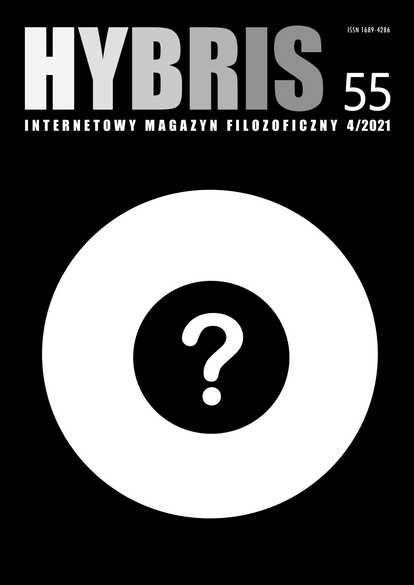Z genealogii nowożytnego doświadczenia świadomości. Chrześcijański rachunek sumienia
DOI:
https://doi.org/10.18778/1689-4286.55.01Słowa kluczowe:
subiektywizacja, jaźń, rachunek sumienia, kultura, historia, nowożytnośćAbstrakt
The article aims to investigate the modern self-experience of an individual from the point of view of the historical conditions that make this experience possible. This undertaking will be supported by the turn to a theory and practice of self-examination as it appears in early Christianity. It is widely recognized that there is a connection between modernity and subjectivity. One of the areas where it is reflected is philosophy. By founding the paradigm of modern philosophy, Descartes finds in his turn to himself a certain basis of cognition and a space where forward progress in the process of building a new system of knowledge may take effect. For Descartes consciousness is, however, a means, not an end. This is one of the reasons why it is not "questioned" sufficiently. Among many questions that were not addressed at all for a long time, one should mention, how the experience on which Descartes bases his reasoning became possible. In the history preceding the Cartesian turn inward, we can identify many interesting moments - which can be found with great confirmation in early Christianity - that play a significant role in the constitution of the experience that will become so important for modernity.
Bibliografia
Annas, J.E. (1994). Hellenistic Philosophy of Mind. Berkeley: University of California Press.
Zobacz w Google Scholar
Arystoteles. (1992). O zmysłach i ich przedmiotach. w: idem. Działa wszystkie, t. 3. przeł. P. Siwek. Warszawa: PWN.
Zobacz w Google Scholar
Arystoteles. (2000). Etyka nikomachejska. przeł. D. Gromska. w: idem. Dzieła wszystkie, t. 5. Warszawa: PWN
Zobacz w Google Scholar
Atanazy Aleksandryjski (św.). (1987). Żywot świętego Antoniego. Antoni Pustelnik, Pisma. przeł. Z. Brzostowska i in. Warszawa: PAX.
Zobacz w Google Scholar
Augustyn (św.). (1998). Wyznania. przeł. Z. Kubiak. Kraków: Znak.
Zobacz w Google Scholar
Doroteusz z Gazy (św.). (1980). Nauki ascetyczne. przeł. M. Borkowska OSB. Warszawa: Akademia Teologii Katolickiej.
Zobacz w Google Scholar
Foucault, M. (2000). Historia seksualności. przeł. B. Banasiak, T. Komendant, K. Matuszewski, Warszawa: Czytelnik.
Zobacz w Google Scholar
Foucault, M. (2019). Wyznania ciała. Historia seksualności. Tom 4. przeł. T. Stróżyński. Gdańsk: Słowo/Obraz Terytoria.
Zobacz w Google Scholar
Gilson, E. (1958). Duch filozofii średniowiecznej. przeł. J. Rybałt. Warszawa: PAX.
Zobacz w Google Scholar
Guriewicz, A. (2002). Jednostka w dziejach Europy (średniowiecze). przeł. Z. Dobrzyniecki. Gdańsk–Warszawa: Marabut.
Zobacz w Google Scholar
Hadot, P. (2000). Czym jest filozofia starożytna. przeł. P. Domański. Warszawa: Aletheia.
Zobacz w Google Scholar
Hadot, P. (2003). Filozofia jako ćwiczenie duchowe. przeł. P. Domański. Warszawa: Aletheia.
Zobacz w Google Scholar
Jan Chryzostom (św.). (2003). Homilie na Ewangelię według św. Mateusza (część druga: homilie 41-90). przeł. Ks. A. Baron, J. Krystyniacki, Kraków: WAM, Księża Jezuici.
Zobacz w Google Scholar
Jan Kasjan (św.). (2002) Rozmowy z Ojcami T.1. przeł. ks. J. Nocoń. Kraków: Tyniec.
Zobacz w Google Scholar
Le Goff, J. (1988). Narodziny czyśćca. przeł. H. Januszewska, „Literatura na Świecie” 4(201).
Zobacz w Google Scholar
Orygenes. (2005). Komentarz do „Pieśni nad pieśniami”. Homilie o „Pieśni nad pieśniami”. przeł. S. Kalinkowski. Kraków: WAM.
Zobacz w Google Scholar
Platon. (1999). Charmides. w: Platon, Dialogi, t. 1. przeł. W. Witwicki. Kęty: Antyk.
Zobacz w Google Scholar
Seigel, J.E. (2005). The idea of the self, Cambridge, New York: Cambridge University Press.
Zobacz w Google Scholar
Sorabji, R. (2006). Self, Oxford: Clarendon Press. https://doi.org/10.7208/chicago/9780226768304.001.0001
Zobacz w Google Scholar
DOI: https://doi.org/10.7208/chicago/9780226768304.001.0001
Taylor C. (2001). Źródła podmiotowości, przeł. M. Gruszczyński. Warszawa: PWN.
Zobacz w Google Scholar
Wawrzyniak S. (2016). Kultura poznania siebie. Upadek czy rozwój? Poznań: UAM.
Zobacz w Google Scholar
Wawrzyniak S. (2021). Wartość samowiedzy w perspektywie historycznej. Zarys problematyki. w: Dialog filozoficzny o człowieku. P. Szymczyk, E. Chodźko (red.). Lublin: Tygiel.
Zobacz w Google Scholar
Pobrania
Opublikowane
Jak cytować
Numer
Dział
Licencja

Praca jest udostępniana na licencji Creative Commons Attribution-NonCommercial-NoDerivatives 3.0 Unported License.






